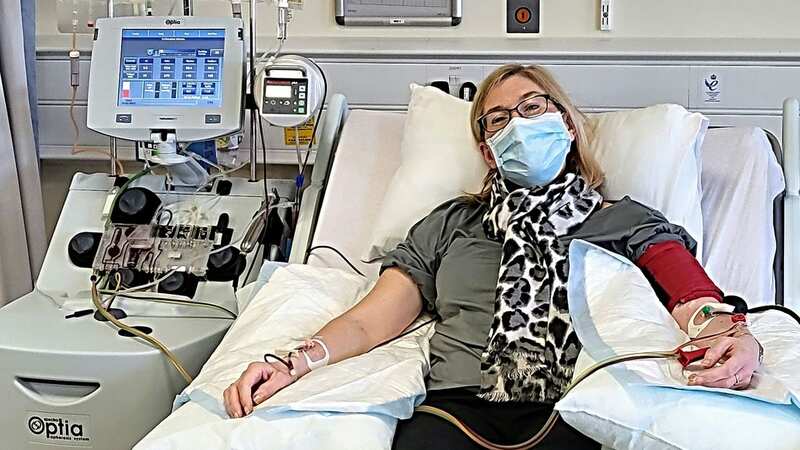'Syndrome Celine Dion diagnosed with left me unable to put my socks on'

When Celine Dion announced she had been diagnosed with stiff person syndrome, very few people had heard of it.
Here we meet others who are living with the condition.
Tracey Reilly had just a 600-yard walk to the post box, but was only half way before her body started to freeze like a statue.
“I tried to turn back but I could only make it a few steps and had to sit on a wall,” she says.
“By the time I was able to find the strength to get home, holding each lamppost to steady me, I had been out for an hour – and I didn’t even get to post my letter.”
 Mum's cancer tragedy after mansplaining doctor bets mortgage she is too young
Mum's cancer tragedy after mansplaining doctor bets mortgage she is too young
Once a keen gym goer and walker, Tracey’s life was turned upside down in 2019 when she was diagnosed with rare neurological disorder stiff person syndrome (SPS), the condition that superstar Celine Dion recently revealed she is battling.
Affecting one in a million people, it causes rigidity of the muscles in the torso and limbs as well as painful spasms, although each sufferer’s symptoms vary, along with the severity and progression.
 Celene Dion this week announced that she was suffering from the condition (Getty Images)
Celene Dion this week announced that she was suffering from the condition (Getty Images)Spasms occur randomly or might be triggered by events such as a sudden noise, light physical contact or emotional stress.
Initially the symptoms may come and go, but most sufferers will develop stiffness of the legs, which affects walking, while the spasms can lead to falls.
Research into SPS is limited but doctors suspect that it is an auto- immune reaction which causes the body to attack the nerve cells that control muscle movement.
Around 60 to 80 per cent of patients have a particular antibody in their blood known as anti-GAD. Women are more likely to have SPS and it tends to appear in those aged 30 and older.
Most people living with the condition also have at least one other auto-immune disorder, like insulin-dependent diabetes – which Tracey has – or certain cancers.
SPS is currently incurable, with treatments only able to stabilise symptoms and slow down its progression rather than stop it.
 Tracey Reilly on her travels before being diagnosed with Stiff Person Syndrome (Collect)
Tracey Reilly on her travels before being diagnosed with Stiff Person Syndrome (Collect)According to the Stiff Person Syndrome Research Foundation in America, diagnosis takes an average of seven years and it can be mistaken for multiple sclerosis, fibromyalgia and Parkinson’s disease.
Tracey says the first sign of a problem came three years before her diagnosis, when she developed lower back pain.
 Woman put on life support for eight days thanks to vaping addiction
Woman put on life support for eight days thanks to vaping addiction
The 52 year old, from Livingston, near Edinburgh, says: “I’d always had back problems but this felt different. I had a busy job in occupational health and travelled every week for work, running around airports in four-inch heels pulling a suitcase. But it got to the point where I couldn’t even reach down to put on my socks.
“I was sent for physio but they realised there was nothing anatomically wrong with me and I was referred to a neurologist.
“By this point I had progressed to having visible tremors and, at times, I couldn’t put one foot in front of the other.
“My balance was becoming an issue and there were occasions when I would be frozen to the spot, unable to move.
“When the neurologist saw me they were almost certain it was SPS because I had developed what they call ‘tin man’ gait.”
Tracey was initially prescribed muscle relaxant diazepam to ease her symptoms, which made a huge improvement almost immediately.
“I went from moving clunkily to feeling almost nimble over a weekend,” she says. “But over time, it became less effective.”
Now she has regular plasma exchange treatment combined with immunosuppressants to lessen her immune system’s attacks on her body.
Tracey has continued to work, having moved to an office-based role as a depot manager, but other parts
of her life have had to change dramatically.
“I used to travel abroad all the time and was at the gym four times a week, as well as walking at weekends,” she explains. I found my old gym clothes in the wardrobe the other day and it was a real punch in the stomach.
“My parents have prepared themselves for the fact they might become my carers – none of us could have imagined that.
“It’s been hard to lose my freedom and independence, but I’ve learned what my specific triggers are and I’ve removed them as much as possible.
“I avoid encountering busy and unpredictable environments, I try to stay warm and I tell people I have SPS so I have a support network.
“I’ve also moved to a ground floor flat to minimise the risk of falls or getting stuck upstairs.”
Tracey, who is single, has been helped through this difficult time by the Stiff Person Support Group, which is run by Liz Blows who lives in Beverley, East Yorks.
Liz, 70, first experienced symptoms in 1990 but it took seven years to get a diagnosis because doctors dismissed what she said. She now gives practical advice and emotional support to almost 1,000 people around the world.
“Fear of the unknown is the biggest worry people have when they come to us,” she says.
“SPS is so very complicated and funding is needed, as any research happening now will take years.”
Despite the hardships of a life with SPS, Tracey wants others who are newly diagnosed, like Celine, to look for positives.
“The worst thing you can do is read about it online,” she says. “There is a lot of out-of-date information or discussion of worst-case scenarios.
“It’s overwhelming and frightening when you hear you have SPS. It’s common to feel depressed and anxious.
“Yes, your life will be very different but you will still have a life. There are ways to live well with it, you just have to find a new normal.”
- Find support at lizblows.wixsite.com/spsuk
Read more similar news:
Comments:
comments powered by Disqus

































